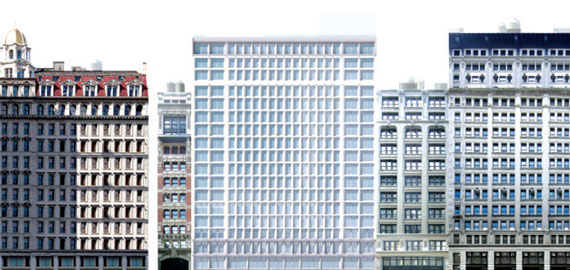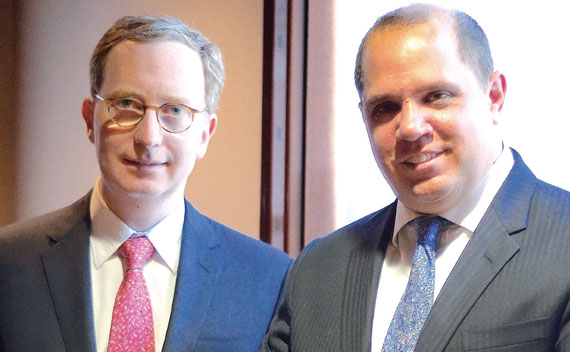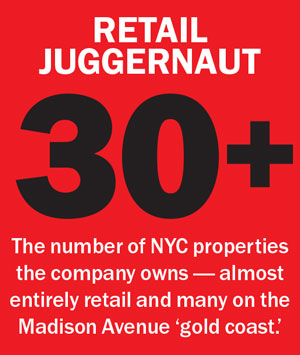Back in 2008, William and Rick Friedland stopped to visit a two-story, red-bricked retail building on Madison Avenue that their family had purchased in the 1970s.
The Georgian-style structure was originally constructed as a taller Moorish-style synagogue in 1885 but underwent a series of quirky design reincarnations over the years, prompting New York Times columnist Christopher Grey to describe it as “just the kind of oddity that makes Madison Avenue fun.”
But for William and Rick — second-generation members of the Friedland retail dynasty — the building, 746 Madison, represented more than just a historic asset. For them, it was an opportunity to wade into the world of New York residential development.
Their plan was to build on top of the storefront to create a new 14-story, 12-condo structure. The design called for connecting the first four stories to a commercial portion of a townhouse on 65th Street that the family also owns. The townhouse would serve as the entrance to the apartments.
But the duo dropped the plans after a long and public fight with neighborhood residents and the Landmarks Preservation Commission, instead opting to add three floors of office space.
Nevertheless, the attempt to redevelop the site — which now counts Italian clothing designer Loro Piana as its flagship tenant — was a sign of things to come for the Friedlands.
For the past five decades, Friedland Properties, a family firm led by its 76-year-old founder Larry Friedland, William’s father, has been known as the landlord of Madison Avenue’s “gold coast.”
With high-end tenants that have included the likes of Ralph Lauren, Céline and Dolce & Gabbana, the Friedlands have in many ways given Madison Avenue its luster.
In total, the company owns more than 30 New York City properties — almost entirely retail. Its New York-area portfolio, which spans from Soho to Washington Heights, is valued at roughly $3 billion, or $1.6 billion before debt, according to a recent Bloomberg story. (While Larry Friedland declined to comment on his net worth to The Real Deal, he disputed that figure as too high in the Bloomberg piece.)
Friedland has said he doesn’t have plans to expand beyond New York. “I’d rather be an expert in a limited area,” he told Bloomberg. “I don’t want to go out to Idaho to look at something.”
Where to deploy?
Given its success, the Upper East Side-based firm would seem to have little reason to change its buy-and-hold strategy.
But over the past decade, it’s been seeking out development opportunities and turning some of its retail sites into residential properties. The Friedlands own about 300 rental apartments. Upon the completion of their next two projects, that number will more than double.

A rendering of a two-building, 288-unit project at 7 West 21st Street
By all accounts, principals William and Rick — whose father, the late Melvin Friedland, co-founded the company with Larry, his brother — are behind the firm’s shift.
They are not the only members of a younger generation changing up the strategy of a family firm in this hot market. Like the Schrons, which TRD recently profiled, William and Rick face a common challenge among real estate scions: how to best use their families’ holdings for new opportunities.
As Jeff Karp, a veteran retail broker at RP Miller Commercial, put it, “They share a burden with other dynasties that have deep pockets — how exactly to deploy capital.”
For the Friedlands, the answer has been to convert some of their commercial assets into residential.
As part of a $200 million investment, the company is currently working on two ground-up rental developments: a two-building, 288-unit rental at 7 West 21st Street in the Flatiron District and a 19-story, 72-unit rental at 2230 Broadway on the Upper West Side. Both projects — two of three planned since 2011 — are slated to open in 2017. Rents at the buildings are expected to be north of $90 per square foot. That’s a notch above Manhattan’s average new development rental price per square foot, which stood at roughly $77 in September, according to appraisal firm Miller Samuel.
In addition, the Flatiron District rental, which landed a $182 million construction loan in June, is the firm’s first development in a neighborhood other than the Upper West Side — a fact sources say may signal a willingness to geographically diversify on the residential side.
Picking their spots
The company’s two completed residential projects have risen on sites it already owns.
“This next generation is more interested in development, to monetize what the family already has,” said Newmark Grubb Knight Frank’s Jason Pruger, who brokered deals for CVS and shoe retailer Aerosoles at three Friedland buildings.
He added: “Now they’re getting proficient at it.”
Family members also told TRD that they have simply redeveloped the sites in their portfolio where retail tenants went bankrupt and vacated the space.
For example, in 2004, the bankruptcy of Upper West Side grocery store Healthy Pleasures on Broadway led to the firm’s first ground-up apartment building, a 22-story, 143-unit rental at 250 West 93rd Street known as the Melar.

Friedland’s son William, left, and his nephew, Rick
But changing market forces have, of course, also factored into decisions about where to develop. “The times have changed and the parcels work better as residential,” Rick Friedland told TRD.
In other cases, tenants’ long-term leases have deterred the firm from residential development, the family said. And following the unsuccessful effort to redevelop 746 Madison, the company was quiet during the recession. Its first post-recession project was a 181-unit rental at 227 West 77th Street called the Larstrand, which opened in 2013.
Back in time
The Friedlands have deep roots in real estate. Larry and Melvin’s family began buying investment properties in 1935. According to Bloomberg, Larry was originally studying to be a pharmacist. But he got interested in buying properties. In 1960, he and his brother founded Friedland Properties. They started accumulating storefronts in Harlem. Then in 1965, the company bought its first property on Madison Avenue.
While its bread-and-butter has never been ground-up construction, Larry said the firm has done its share of development, remodeling and renovating.
“We’ve always done some development,” he said. “We completely gutted buildings and rebuilt them as apartments. It’s all the same ball of wax.”
Yet as 746 Madison showed, the family’s redevelopment endeavors have not all been smooth.
In August, Friedland countersued a co-op board to recoup the money it spent fighting a lawsuit filed by the board. That suit sought to halt construction of Friedland’s single-story retail extension at 817 Madison, the former home of Donna Karan’s flagship store.
The co-op, which was located behind Friedland’s building, argued that construction would encroach on a shared courtyard space and therefore require board approval. The case is still pending.
When asked if they want to tackle bigger development projects, the Friedlands seemed reluctant, saying the construction process is hard.
“Market prices seem very high right now,” William told TRD. “Rental development is not as profitable as it looks from the outside.”
 He added: “We feel like our plate is full.”
He added: “We feel like our plate is full.”
On the projects they do have, they have teamed up with veteran New York developer Rose Associates, which still manages the Melar and the Larstrand.
Pruger said the family approaches ownership with a long-term view, which is why they’ve avoided building condos. There will always be a demand for rentals, but condos are more vulnerable to economic swings, he said.
‘Retail guys’
Ultimately, retail is still very much the family’s core business.
RP Miller’s Karp said he does not expect the younger Friedlands — who sources describe as smart, classy and self-effacing — to sell off any of their retail to finance their residential projects.
“If the sons started selling on Madison Avenue, they would be executed [by the family],” he said, adding, “The properties are cash cows.”
Retail asking rents along Madison Avenue between East 60th and 70th streets are exceeding $2,000 per square foot, he said.
Douglas Elliman’s Faith Hope Consolo, who has worked with the Friedlands on leases with fashion brands such as Betsey Johnson, Malo, Brunello Cucinelli and Manrico Cashmere, described the family as “tough but very fair” landlords. They protect “their treasured spaces with a tight leash,” she said.
And while the family has expanded into development, it has continued to make big retail buys. In 2012, the firm paid $141.5 million for a 19,100-square-foot retail property at 706 Madison, which once housed the Bank of New York Mellon.
The family’s patriarch warned there is no tectonic shift, nor will there be. “We still see ourselves as retail guys,” Larry said. “We don’t sell.”
He described the family as tight-knit. “We do everything together,” Larry said. “The three of us sit at a table during the day.”
Still, while those sit-down conversations may be dominated by talk of retail strategy, they are likely to include residential development too.
“The younger generation at Friedland is moving forward with the market,” Consolo said. “They have a big appetite and it’s very possible they’d go bigger.”
